29, August 2022
Why God Must Not Be Set Aside 0
“There is no saint without a past; there is no sinner without a future” Meditations on the Life of Augustine of Hippo (AD 354 – 430)
I love the month of August, for particular reasons: It is the month of my birth, but more importantly, August is the month of my favorite saint, Augustine of Hippo (August 28). His feast day is preceded by that of his mother, Monica (August 27). And this particular August, I had the great joy of baptizing my niece, Mariette, a very promising young girl. I have repeatedly said to a few close friends that during the liturgy of my Christian burial, I would love two texts to be placed on my casket: the Bible and my Loeb’s Classical Library version of Augustine’s The Confessions. I stopped keeping count on the number of times that I have read Augustine’s Confessions. It is the one text that have accompanied much of my intellectual maturation and career. Why I am here? What is the purpose of life? What is the purpose of suffering? What is the source of everything? What does it mean to love and be loved? Can the bliss in sexual expression bring about complete human fulfillment? (Plato’s Symposium and Benedict XVI’s Deus Caritas Est). Is there a relationship and if there is, what is it, between love, sex and friendship? Why is love and its expression the defining quality of human life – amor meus, pondus meum, wrote Augustine. What does it mean for the human being to be free? And above all, Who is God? Does God know me? Is God interested in me? Am I seeking God or is God the first to go in search of me? These, and more, are some of the questions that characterize Augustine’s Confessions.
Greek philosophy grappled with the question of the meaning of life from the perspective of understanding the source of everything. The Pre-Socratics, heavily cosmological, gave different answers: water, air, fire, boundless or the unlimited, animated by two forces, love and hate; and change or no change: Thales, Anaximander, Anaximenes, Heraclitus, Parmenides. I have often marveled at how close the Pre-Socratics came in getting the correct sacramental symbols that would thousands of years later, mark Christian initiation: Thales’ water (Baptism); Anaximander’s “boundless or unlimited” and Anaximenes’s “air” (could very well correspond with the Holy Spirit’s presence at Confirmation); and the same could be said about the Heraclitean fire. But that might be stretching the significance of ancient Greek philosophy a little bit too much!
What is of consequence is that humans have always sought to resolve the question of their purpose in this world, and religion has played a crucial role in this dilemma. One can only think of Kenjo Jumbam’s The White Man of God or Achebe’s Things Fall Apart. Both portray the dramatic tension that characterizes this question in the light of a clash of religions and civilizations. When we understand the meaning of our existence, even if not fully, such a consciousness has a profound implication on how we continue to live, as Viktor E. Frankl demonstrates in his Holocaust-survivor retrospections, Man’s Search for Meaning. In summation, and here Frankl cites my German friend Nietzsche, “he who has a why to live for can bear almost any how” (p. 104). Let us return, once again, to Augustine.
As my great teacher of Augustine at Boston College, Peter Kreeft, himself, a little Augustine, a little Aquinas and a little Lewis, often repeated, Augustine is the first modern and contemporary philosopher, for when Augustine uses “I,” it is in the sense in which contemporaries use “I,” – but only without the egoism of contemporary culture. Augustine remains a figure too interesting to be ignored. You can either admire him and esteem and appreciate his life and work, or you can hold him in scorn and disregard. But it is difficult to completely ignore him all together. On almost all the major themes that have come to define Christianity, the fingerprints of this great bishop of Hippo are noticeable, for good or for ill. He shaped the way Latin Christianity came to see God, politics, war, sin, grace, freewill, psychology and the practice of religion. At his death, he left behind over 5 million words of writings.
Amongst his writings, Augustine wrote three histories that will never go out of relevance: the history of God (De Trinitate); the history of the world (De Civitate Dei); and the history of man and woman (De Confessiones). Only an Augustine could have thought of writing a history or a somewhat biography of God! But such was Augustine, whom I have come to love profoundly thanks to the path established by Ratzinger/Benedict XVI, a contemporary and living Doctor of the Church from Bavaria. I will focus on Augustine’s history of man and woman, as captured in his Confessions, noticeably different from the two other Confessions that have marked the literary world, namely, The Confessions of Jeremiah as contained in the Book of the Prophet Jeremiah; and The Confessions of Jean-Jacques Rousseau. For now, let us focus on two key passages in Augustine’s Confessions that I believe, fittingly capture his dramatic life and can speak to us today:
Passage One: “You inspire us to take delight in praising you, for you have made us for yourself, and our hearts are restless until they rest in you.” (Confessions, I, I, (1)).This is the most quotable phrase in all of literature outside the Bible. To understand why this is so, we must look at, even briefly, Augustine’s existential itinerary. This phrase of the restless heart speaks to many of us because, in the final analysis, we see ourselves in Augustine. In my opinion and that of many persons more intelligent, that explains why Augustine commands so much attraction. He is like us. He is like me. His story is my story: of sin, brokenness, estrangement, and yet, of forgiveness and return. He grew up a young man in Thagaste (present day Algeria), under a pagan father and a very pious mother. Augustine, like many a contemporary young person, was attracted to the delights of sensual pleasure and fame. His various trappings reveal a youth bent on exploring all that life has to offer. And yet, as Augustine would notice, in the delights that enslaved him, what he was really seeking was love, who’s most fulfilling form is God.
Fame, power, money, knowledge, sexual gratifications did not satisfy Augustine’s soul. There was always what Blondel later characterized as the wedge between the willing will and the willed will. The more indulgent Augustine became, the more he realized that he was chasing shadows. Augustine had his back against the wall. He could either ignore the emptiness or void within him and go on living as if that void was not there; or, he could face the music and say, I have tried all else, I need help!
If there is one thing that Augustine was incapable of, it was self-deceit. Augustine could not lie. And so, at this point, seeing the futility in everything, Augustine cries out from the depth of his soul: “I have made myself into a barren land” (Confessions, II, 10, (18). Long story short, Augustine, following a religious experience reminiscent of Jesus in the Garden of Gethsemane, allows himself to be taken over by God. He had spent a greater part of his previous years searching for meaning. And now, he finally comes to the realization that rhetoric, fame, money, power and sex cannot make him happy, if these are severed from God. It is only in God that these human desires and manifestations attain their true meaning and deepest potentials. In effect, Augustine arrives at the realization that no created reality can fulfill the deepest yearnings of his soul. Without God, even the best of pleasurable encounters left him feeling empty. Why? Because God made us for God’s self, and nothing less than the very Divine life can satisfy the human soul. This is an a posteriori realization that is both penitential and yet, liberating: only in and with God do I find the true meaning of my existence. Every other choice continues to leave my heart restless.
Passage Two: Hence, it is precisely the realization of the barren land that becomes a fertile ground for the new Augustine. As Ratzinger points out while reflecting on Augustine, every conversion is a new beginning for the Bishop of Hippo. Augustine, under the light of truth, arrives at the retrospective consciousness that every saint has a past, and every sinner, a
future: “Late have I loved you, O Beauty, so ancient and so new, late have I loved you. And see, You were within, and I was in the external world and sought You there, and in my unlovely state I plunged into those lovely, created things that you made. You were with me, and I was not with You. (Confessions, X, 27, (38)). Augustine is now at a point in which he allows himself to be found by God. While initially Augustine might have thought that his restless heart was he seeking God, at this second layer of consciousness, Augustine arrives at another new discovery: It was not Augustine that was seeking God. It was God seeking Augustine, unbeknownst to him. God’s love for Augustine predated Augustine’s waywardness and estrangement from God – Seroteamavi. God’s love for Augustine never withered, even when Augustine was consumed by sin. While Augustine was carried away by external delights, God was busy working within in Augustine’s soul, pulling Augustine towards Himself. As Ratzinger poetically pointed out in the homily inaugurating his pontificate in 2005, we suffer on account of God’s love, for the world is saved by the patience of God and destroyed by the impatience of men and women.
What do these two texts, restless hearts and the realization that God was within and Augustine, without, teach us? Firstly, they tell us that to find God is to find myself. That was Augustine’s great discovery. God does not deprive me of what makes my life beautiful, true and good. If anything, finding God brings me to the fullest realization of who I am, of my purpose and the meaning of my life. If this Augustinian conviction is true, namely, that by finding God I end up finding myself, then it follows that to set God aside is an injustice against man and woman. It deprives us of a depth and breadth that encountering God opens us to. To find God is to allow my small agendas to be broken into by the ocean of God’s power, which is love. Finally, we can resolve the Socratic puzzle: Man, know thyself! I know myself when I know God, and I know God when I know myself, for God has created me for God, and only in God can I find the meaning of my life. Secondly, with Augustine, I make another great discovery: I was not the one seeking God, after all. It was God seeking me. I have personally found that so consoling, so empowering, and so encouraging: Maurice, you have not been the architect. God has been, all along, even when you were not conscious of it. God has been the one seeking you, from birth in Mamfe till the present in Boston. God has been there all along, even when you made choices against God, embracing a life of sin. God has been searching for you, offering you a future, for, to cite Augustine again, there is no saint without a past, and there is no sinner without a future.
As we celebrate the feast day of St Augustine today, August 28th 2022, may his example serve as an inspiration to us, that only God can satisfy the longings of the human heart, and that God’s love is so much that every sinner has a future, myself inclusive, if only I but turn to God for mercy, for, as Augustine again wrote, do not despair, one of the thieves was saved; do not presume, one of the thieves was condemned. St. Augustine of Hippo, pray for each one of us, for our world, and for our Holy Mother the Church, she, the Daughter of Zion. Pray for us not to set God aside for what appears to be other pressing concerns, for, as your life teaches us, to set God aside eventually ends with us setting ourselves aside. But with God, we have a future. For the sake of human beings, therefore, we must not set God aside, for to do away with God, to postpone entering into a living relationship with God, to delay allowing God to find us, to exclude God because we have more pressing concerns, eventually ends up excluding us and leading us up a Sisyphean hill!
By Fr Maurice A. Agbaw-Ebai
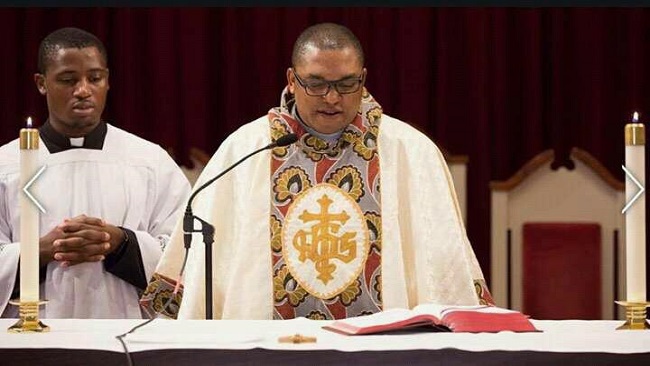
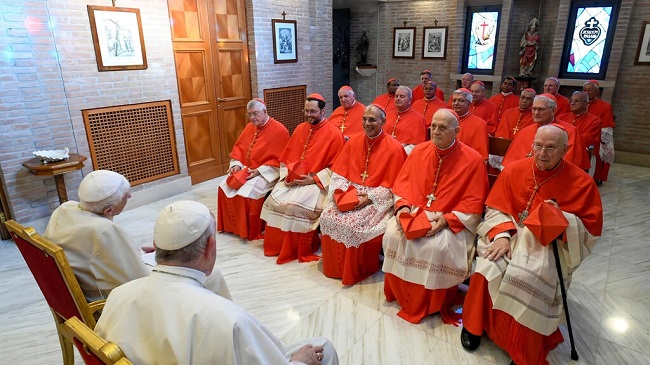

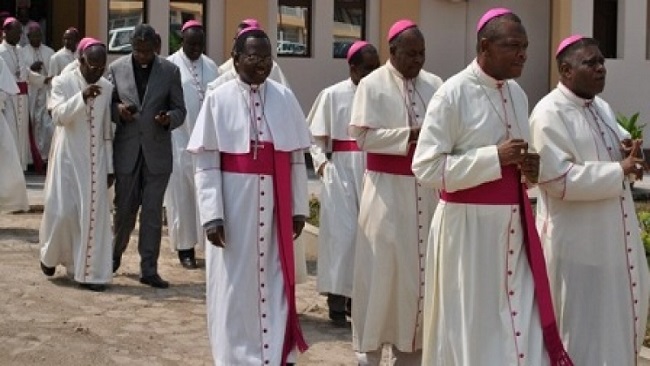

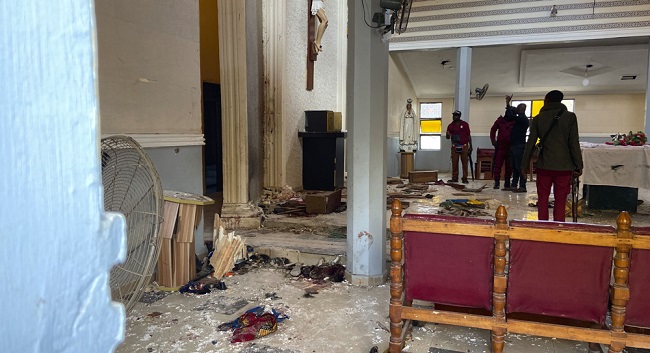
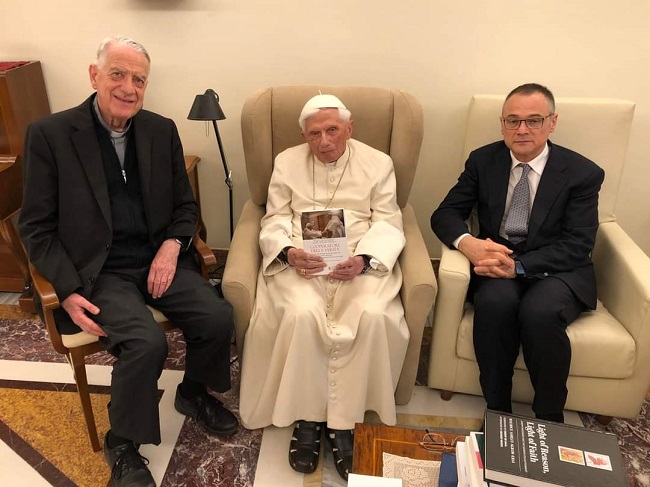
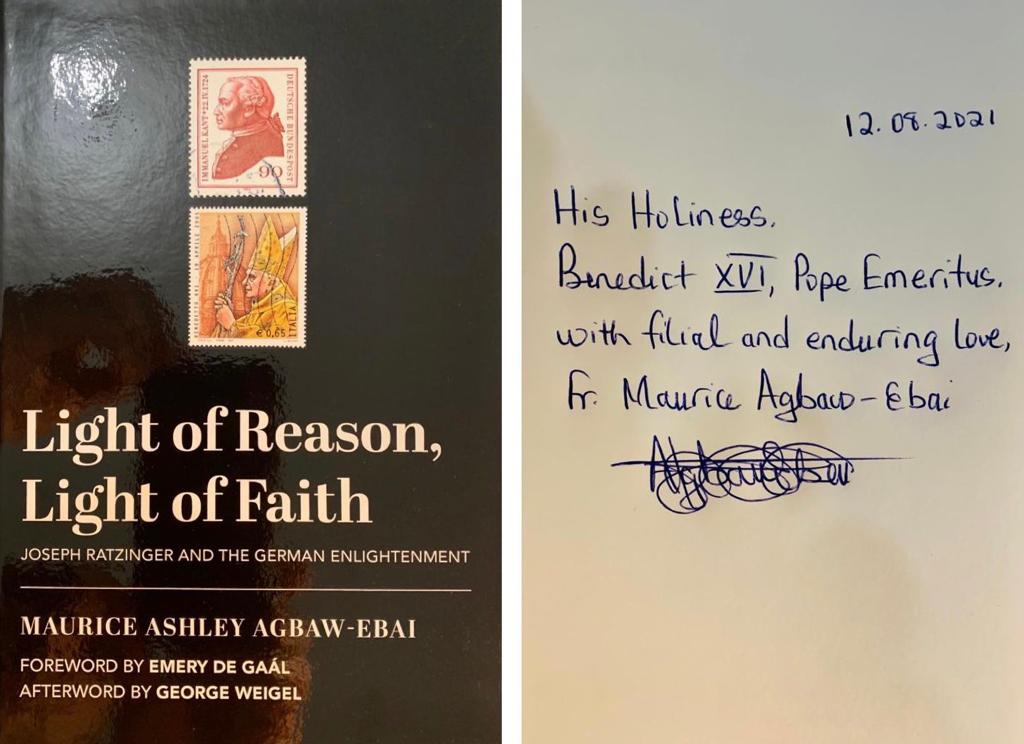


















4, September 2022
The Holy Father Pope Francis beatifies ‘Smiling’ John Paul I 0
Thousands of people gathered in St Peter’s Square on Sunday as Pope Francis presided over the beatification of John Paul I, the so-called “Smiling Pope” who led the Catholic Church for just 33 days before dying in contested circumstances.
John Paul I, the son of a bricklayer from the Dolomite mountains and a particularly warm and pastoral figure, was elected pope on August 26, 1978, at the age of 65.
He died just 33 days later, on September 28, 1978, of a heart attack, making him the shortest serving pontiff in modern church history.
A crowd of several thousand including Italian President Sergio Mattarella gathered under umbrellas through a thunderstorm to listen to the beatification mass — a step before canonization and becoming a “saint”.
“With a smile, Pope John Paul managed to communicate the goodness of the Lord,” said Pope Francis during Sunday’s mass.
“How beautiful is a Church with a happy, serene and smiling face, that never closes doors, never hardens hearts, never complains or harbours resentment, does not grow angry or impatient, does not look dour or suffer nostalgia for the past.”
A wall hanging representing the late pope was hung on the front of St Peter’s basilica.
The death of John Paul I death sparked intense speculation as to the cause, from suicide — he seemed reluctant to take on the position of pope — to murder, allegedly by those who opposed his plans to reform the church, particularly the powerful Vatican bank.
Many have since discounted this and biographer Christophe Henning said the swirling rumours can be explained by the sudden nature of his death and the “calamitous communication” by the Vatican at the time.
No autopsy was conducted to determine the cause of death, and the Vatican issued inconsistent and false information about what happened.
For example, his lifeless body — sitting in bed, his reading glasses on his nose and typewritten documents in his hand — was found by a nun.
However, the Vatican did not want to acknowledge the presence of a woman in his bedroom, so said his secretary found him.
“For me it does not seem that there is really a doubt” about his death by natural causes, particularly given “we know that he was in fragile health”, Henning told AFP.
‘Friendly to everybody’
The Vatican announced in October 2021 that it had recognised a miracle attributed to John Paul I, allowing him to become beatified, a process when a person becomes “blessed” and the final step before becoming a saint.
The miracle was the sudden healing of a gravely ill 11-year-old girl in Buenos Aires in 2011, after a local priest prayed to the late pontiff.
Under the rules of the Catholic Church, in most cases a second miracle needs to be recognised before someone can be made a saint.
Born as Albino Luciani on October 17, 1912, in the northern Italian town of Canale d’Agordo, John Paul I rose to become Patriarch of Venice, Cardinal and then head of the Catholic Church.
The last Italian pope, he was seen as a man of consensus, of humility and simplicity and a strong sense of pastoral duty.
“Open to dialogue and listening, he gave priority to pastoral visits and direct contact with the faithful,” the Vatican said in a beatification brochure.
He defended the church’s opposition to abortion and contraception while also seeking to reform its governance.
Sister Margherita Marin, who helped John Paul I in the papal apartments, recalled a man who was “friendly to everyone”.
“He knew how to treat his colleagues with a lot of respect,” she told a Vatican press conference on Friday.
Among the most recent popes, John XXIII (1958-1963), Paul VI (1963-1978) and John Paul II (1978-2005) were proclaimed saints.
The predecessor of Pope Francis, Benedict XVI, is still alive and living in the Vatican after resigning in 2013.
Source: AFP